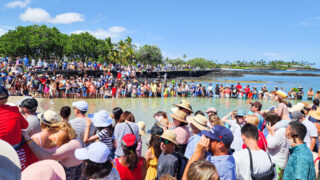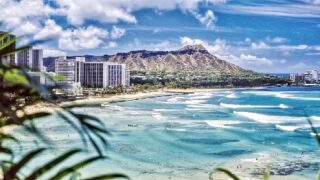Where do you stand on Hawaii’s new Green Fee and paying more for every hotel or vacation rental stay? Beginning in January 2026, the accommodation tax will increase by 0.75%, with the expectation of generating $100 million annually for climate and conservation projects.
The Green Fee Advisory Council meets virtually today, September 24, at 10:30 a.m. Hawaii Standard Time, for input on how that money will be used. This public meeting is open to visitors and residents. The real question is whether we will see cleaner beaches, safer trails, and restored reefs or just another tax that disappears into bureaucracy.
How much more will you pay for Hawaii hotels and vacation rentals?
The Green Fee was signed into law last year as Act 96. It increases the existing Transient Accommodations Tax from 10.25% to 11% starting January 1, 2026, including county TAT surcharges of 3% and the pass-through General Excise Tax, which hotels list at 4.712% in all counties. The combined hotel tax will be approximately 18.712% beginning January 1, 2026, which is equivalent to around 19% in practice. For the first time, it also applies to cruise ship stays in Hawaii.
The state projects that the roughly $100 million annual revenue will be deposited into a dedicated account (rather than the general fund) to fund projects that protect reefs, trails, beaches, and cultural resources.
That dollar figure is substantial enough to make a significant difference if spent effectively. Hawaii’s visitor industry generates billions in lodging taxes every year, but this is the first time a portion has been earmarked explicitly for climate and conservation projects. State officials say the aim is to link visitor spending directly with the protection of the very natural resources travelers come to see.
Hawaii’s history shows visitor taxes never stay small.
Hawaii has a long history of introducing visitor charges that begin small and then expand. When the Transient Accommodations Tax was first established, it was approximately 3% lower than it is today. Over the years, this issue has been raised repeatedly, including when the state took the counties’ money and then the counties added their own additional surcharges.
Residents often remark that in Hawaii, no tax ever truly disappears; once in place, the pressure to increase revenue remains constant. That is why, even though this Green Fee is set at 0.75%, many are already skeptical that it will stay there. Environmental groups and some lawmakers will push for more, while the hotel industry and airlines will fight hard to limit increases.
For visitors, that uncertainty makes a difference when budgeting trips. Visitors are already grappling with hotel prices that can far exceed $500 a night and vacation rentals that face their own rising costs. An increase of less than one percent may not sound like much, but over time, the total bill for a Hawaii vacation has climbed to the point that every extra line item is noticed.
Where will your $100 million actually go.
How the $100 million will be spent is of paramount importance to visitors and residents, who all appear to remain skeptical. Governor Green has appointed a 14-member Green Fee Advisory Council to recommend projects and priorities.
Conservation advocates see the fund as a rare opportunity to invest in reef restoration, shoreline stabilization, and long-deferred trail maintenance. Others, however, argue that wastewater systems, invasive species control, or cultural programs should take precedence. That disparity could result in conflict over whether the money is being spent as initially promised.
Advisory councils in Hawaii have a weak record of transparency and measurable results. Too often, funds created with specific goals have ended up diverted to cover budget gaps or unrelated expenses.
That track record leaves many skeptical that visitors will see real improvements on the ground. Travelers want to know if they will find cleaner beaches, better maintained roads, parks, and restrooms, or safer hiking trails. If not, the fee risks becoming another line item that undermines confidence. Hawaii has a limited window to prove that this program will be different.
The global context.
Hawaii is hardly alone in turning to visitor taxes as a way to manage tourism’s impact and generate revenue for environmental projects. Venice has introduced a day-tripper fee that will return in 2026. Barcelona and other European cities have added nightly hotel surcharges tied to tourism management. Even New Zealand has tested versions of visitor contributions aimed at offsetting environmental wear and tear.
The difference is that Hawaii is positioning this Green Fee as a direct climate measure, not just a tourism management tax. That makes the accountability issue even more critical. Travelers will be watching closely to see if their money is tied to visible, climate-related projects or whether it disappears into general spending.
The real cost of a Hawaii vacation in 2026.
For travelers, the math is simple, and the amount is minor, at least for now, but worth spelling out. A hotel stay in Honolulu, which currently carries a combined lodging tax of approximately 18.0%, will increase to roughly 18.7% in 2026. On a $500 nightly rate, that means about $89.80 in tax now versus about $93.60 next year. Over a 7-night stay, the difference comes out to roughly $26.
Cruise passengers will also feel the fee, although the collection method is still being finalized. The expansion of the tax to cruise stays highlights how the state is trying to make all visitor categories contribute, not just hotel guests.
Will the Green Fee restore trust or push travelers away.
Hawaii is in a tricky position. On one hand, residents have demanded that visitors contribute more to offset environmental and infrastructure pressures. On the other hand, tourism remains the state’s lifeblood, and there is growing concern that Hawaii is pricing itself out of reach for many families.
That tension was on display at the recent tourism conference, where the Green Fee was front and center. Supporters called it a bold step to align tourism with sustainability. Critics questioned whether it would simply become another burden on travelers with little to show for it. Both sides are right to some degree, which is why the execution matters so much.
The rising cost of travel, combined with new restrictions and fees, has created a mood of uncertainty among repeat travelers. The Green Fee has the potential to reinforce that sentiment if not managed carefully.
What happens next, and how you can weigh in starting today.
The next year will be critical as the Green Fee Advisory Council is beginning to outline criteria and priorities for projects. Public hearings are expected. The legislature could revisit the structure if pressure mounts. And lawsuits from the cruise industry and hotel associations remain a possibility.
You are invited to join their first virtual public meeting at 10:30 a.m. HST on September 24. It is open to everyone, including residents and visitors, and will outline how the fee will be managed. That meeting will be the first opportunity to hear directly how Hawaii plans to use the $100 million that travelers will be paying each year.
For now, travelers can expect to pay the fee starting in January 2026. Whether they will see clear benefits in the next couple of years is the bigger test. If the program delivers visible improvements, it could become a model. If not, it risks reinforcing skepticism about Hawaii’s handling of visitor dollars.
How do you think Hawaii should prioritize spending the $100 million Green Fee funds?
Get Breaking Hawaii Travel News







Are we to believe that a .75% increase is going to generate 100 million after the first year?
“if spent effectively”…. like that’s ever happened before!!!!
“…just another tax that disappears into bureaucracy.”
You hit the nail on the head. What makes anyone think your corrupt government will do anything but waste the money on favors owed or “payback” for something else. Look at it at the end of the year and you will undoubtedly see they “blue” it. You get what you vote for. Unfortunately, the voters of Hawaii have yet to learn that lesson.
The “Green Bill” authored by a politician named Green, and paid for by everyone Green in the face due to sick stomachs.
Sounds like some kind of sick joke, no?!
Please vote better Hawai’i…Please??!!
This tax system only works if people come. No tourists or bookings. No TAT revenue for the state of Hawaii. IMO Hawaii is already taxing, attaching tourists fees, permit and admission costs to tourists and residents get not all but most for free. IMO you can’t tax your way into prosperity.
Thank God I’ve been to Hawaii 14 times. But I will never to this incompetently run state who gouge tourists. Hawaii economy will soon crash. No one can live off taxing tourists.
Aloha, so why the need to make additional taxes on the tourists who are not the ones dumping old car tires by the beaches, old cars, refrigerators, stoves, water heaters, mattresses, and so much more in the bushes and along the cane roads?
No additional taxes on the residents who are doing the environmental damage to the islands that they want to protect?
Destroying the economy will not fix the environment.
Put me down as one who believes that this will simply be just another tax that disappears in Hawaii’s bloated and incompetent state government bureaucracy, a sentiment that is stated in the opening paragraph of this article. I have absolutely no confidence that the money raised from the tax will go to improve beaches, state parks, infrastructure, and/or the environment.
Hawaii’s one party government is intoxicated with a tax and spend mentality that has nothing to show for it.
After an annual 8-10 day February trip to Maui for 25 years to escape Wisconsin winters, we stopped going a year ago. We stopped feeling welcome and the costs keep rising and now another tax tacked on.
Europe has now become a destination of choice. Same hours of flight from Chicago.
Doubt we’ll return.
The fact that you’re asking this question should be your answer. Other taxes and fees have quietly disappeared into the general revenue,with zero accountability. Why will this be any different? This will end up being just another tax and nothing will change. Look at Hawaii’s track record!
We’ve all heard of various new taxes, and programs that will have their own “separate fund” and not be part of a general fund bucket. They usually go the way of the Social Security “lock box” fund.
Yes the money, if actually spent on Conservation projects in high use areas would help immensely if overseen by people that would be accountable for the money.
As far as helping Climate Change, Hawaii’s leaders, even with their self aggrandizement and omnipotence, can’t do a thing about it.
Mother nature will rule .
The way tourists are treated and taxed doesn’t make me want to visit at all. We had booked a cruise to the Hawaiian islands which is scheduled for March of 2026. Our travel agent is unable to tell me how much these taxes will affect the cruise price. At this point it’s a matter of principal and since the deposit I have paid is refundable and/ or transferable I for one am looking into changing my cruise destination. I’m not paying more taxes to visit when I’m not even getting off the ship. Sorry – not happening.
As a old dairy farmer said once. You can only milk a cow so much until the tit is dry. So goes with all the hawaiian taxes.
Hi.. love your news letter and appreciate straight forward point of view! Wondering why my comments haven’t been published lately? Not sure if they are too provocative or you interpret to be political which their not. Thanks for your review.
Seriously, they cannot even build a train within budget and on time. How are they going to do anything about climate change? Everyone knows it is a tax to enhance our politicians pockets. Yet people keep voting into office.
The tax increase is the Transcient Accomodations Tax which in essence is to pay to take care of homeless people on Hawaii. IMO no beach restroom cleanup will take place because they don’t want homeless pitching tents on the beach. If the 10.25% tax can’t get the existing tent camps off the street what will the .75% do. Nothing. Except make your hotel stay a bit more expensive.
I have no belief that this money will benefit me as a visitor. Politicians? Yes. Other strap hanger? Yes. Visitors? No way will we see a “benefit” from this additional tax.
This Green Fee sounds like a good idea in theory, but Im really worried itll just be another tax that disappears into the system like all the others in Hawaii. Its good that the money is supposed to go to climate and conservation projects, but with all the skepticism about how advisory councils use funds, Im skeptical this will actually lead to cleaner beaches or better trails. If visitors have to pay more, they deserve to see tangible results. The fact that hotels and airlines are fighting against increases just makes me think they dont want to contribute their fair share. I hope the advisory council is transparent about where every dollar goes, because if not, this fee could backfire and turn people away from visiting Hawaii altogether.
Tai d, could you please define what you mean by their fair share? Please be specific.
Aloha 🌺🌴 🌊
Well i hope, no, I Pray!!…that our Natatorium will see the funding it needs to restore it too original condition, more than enough even before all that money💰 …sad
🌴🌺🌊 Mahalo
The truly outrageous “Green Fee” is what they are charging at Hawaiian golf courses:
Manale – $550 (+ $1,400/night hotel room; play restricted to hotel guests)
Kapalua – $500 (closed now; who knows if/when it will reopen)
Ka’anapali – $295 (for a mediocre, overcrowded resort course)
Wailea – $285 (for a nice, but still overcrowded resort course)
Maui Nui – $100 (for a marginal muni-quality course)
I’m not even bothering to bring my clubs when we go to Maui next month; I have much better/cheaper golf options here in SoCal.
Though we’ve been coming to Hawaii at least once every year since 2005, this trip may be our last trip. We are starting to look elsewhere for travel options…
The last time I went from my home in Maui to a. hotel on Oahu was for a dear friend’s funeral. I never saw the beach, nor. did I visit tourist spots. I have a family member who goes to Oahu for cancer checkups. The airfare is expensive as is the hotel bill. On top of that, medical services are subject to 4.17 percent tax in Hawai’i. This is ordinary life if you live on a neighbor island. No wonder our most precious resource, our children born and raised here, are moving to the Mainland. I personally am happy to show aloha and Hookipa (hospitality) to visitors. Please come visit this place like no other.
Taxing hotel visitors also includes taxing locals seeing family on other islands. Another horrible idea from our “leaders”. If it weren’t for tax & spend, they’d have no ideas. Claiming to raise $100 million is a “Shibai” (local for scam). They will in fact lose money because visitors will stay away, and the resulting budget deficit will, once again, have to be paid by raising local taxes on Hawaii residents. Proponents of this madness have revealed No specific “climate change” nor other “conservation” projects “needs”, nor exactly how much those will cost. That should have been done first. After that, then figure out how to raise the money .
First priority for use of green fee is to protect beaches eroded by sealev rise.
Famous west Maui beaches like kaanapali , kahana and Napili have completed required environmental assessments and waiting for funding for refurbishment
Typical One Party mandate, “a Tax by any other name”, Tourism drives the Economy, so Governor Green, chose to Tax tourists for coming to another State to spend $ vacationing or doing business! The cozy ‘Green’ caveat of Ecology, like the former Governor Ige, taking of County Hotel Taxes for the State’s General Fund, looks to follow the the pattern where, there is no Plan in place for usage of this Tax. Why would those going on Business that enhances Hawaii as a State be Taxed, not using Beaches, but paying for Room and Transit to enhance Hawaii as a Marketplace?
Green Fee Advisory Council = the next phase of Hawaii government graft & corruption